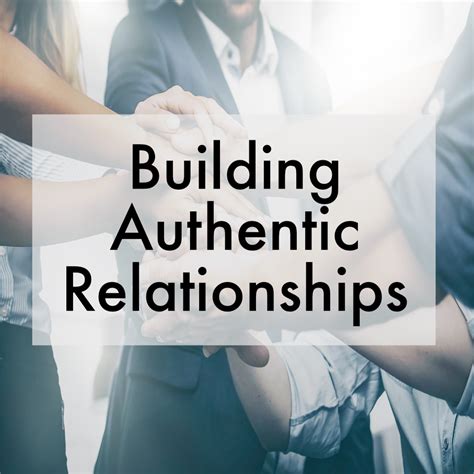In a world steeped in superficial connections and fleeting encounters, many yearn for something deeper – something that transcends the boundaries of mere acquaintanceship. The desire to forge meaningful relationships, like kindred spirits or trusted confidants, is an innate longing embedded within the human psyche. Yet, in a landscape characterized by virtual exchanges and fleeting interactions, building true connections has become an arduous journey.
Unearthing the treasure trove of genuine friendships requires more than just serendipity – it demands a conscious effort to cultivate lasting bonds. Just as a master painter skillfully combines various shades to create a vivid masterpiece, the art of building authentic relationships involves a delicate interplay of trust, vulnerability, and mutual understanding.
Embarking on this transformative journey toward building connections that stand the test of time necessitates an unwavering commitment to self-growth. It requires courageous exploration of one's own vulnerabilities and embracing the essence of empathy, for true connections are forged in the crucible of genuine understanding and compassion.
The Impact of Authentic Relationships

Creating genuine connections with others has the power to profoundly affect our lives. By forging authentic relationships, we can experience a sense of belonging, trust, and understanding. These connections go beyond superficial interactions and allow us to be our true selves, without judgment or pretense.
When we cultivate authentic connections, we open ourselves up to the possibility of finding kindred spirits who share our values, interests, and passions. These relationships provide a supportive network of individuals who can offer guidance, encouragement, and empathy. They become an integral part of our lives, offering companionship, understanding, and a sense of fulfillment.
Authentic connections also have a significant impact on our emotional well-being. When we surround ourselves with people who genuinely care about us and accept us for who we are, we experience a deep sense of validation and acceptance. These relationships become a source of emotional support, helping us navigate life's challenges and celebrate our successes.
Furthermore, authentic connections foster personal growth and self-awareness. Through interactions with others who genuinely listen, challenge our perspectives, and provide valuable feedback, we can gain valuable insights into ourselves and our beliefs. These relationships serve as mirrors, reflecting back our strengths, weaknesses, and opportunities for growth.
Authentic connections require effort and vulnerability. They require us to be open, honest, and willing to invest time and energy. However, the rewards they bring far outweigh the challenges. By nurturing authentic relationships, we can create a supportive network of individuals who enrich our lives, empower us to become the best versions of ourselves, and provide a sense of belonging that fulfills our deepest human needs.
- Authentic connections bring a sense of belonging and understanding.
- They provide a supportive network for guidance and empathy.
- Authentic relationships positively impact emotional well-being.
- They foster personal growth and self-awareness.
- Investing in authentic connections is worth the effort and vulnerability.
Unveiling the Essence of Authentic Bonds in the Digital Epoch
As our world becomes increasingly interconnected through the vast expanse of the internet, the landscape of human relationships has taken on a new dimension. In this digital age, it is essential to navigate the realm of virtual connections and unveil the underlying essence of genuine bonds. Amidst the virtual constructs and superficial facades, understanding the core elements that contribute to authentic connections is paramount.
Unmasking the Illusion: In a world dominated by screens and avatars, it can be challenging to decipher the true essence behind virtual interactions. The key lies in uncovering the authenticity that transcends the digital veil and makes connections more than just pixels on a screen.
Cultivating Emotional Resonance: Genuine connections thrive on emotional resonance, where both parties engage in meaningful and heartfelt exchanges. It is the ability to connect on a deeper level, sharing vulnerabilities, and experiencing empathy that distinguishes superficial connections from profound friendships.
Fostering Trust and Transparency: Trust is the foundation on which genuine connections are built. In the digital age, transparency becomes an essential component in maintaining trust. Being honest, genuine, and reliable in our virtual interactions fosters lasting relationships based on mutual respect and understanding.
Embracing Vulnerability: In a world that often promotes perfection and masks vulnerability, embracing our true selves is a catalyst for genuine connections. By sharing our authentic experiences, fears, and aspirations, we create a space that encourages others to do the same, fostering bonds that go beyond superficialities.
Nurturing a Culture of Connection: Building genuine connections in the digital age requires conscious effort and dedication. Actively seeking out opportunities to connect with others, fostering open and inclusive communication, and valuing the time and presence of each individual forms the bedrock of a culture that celebrates authentic connections.
In this era of virtual connectivity, unlocking the essence of genuine connections is an art. By unmasking the illusion, cultivating emotional resonance, fostering trust and transparency, embracing vulnerability, and nurturing a culture of connection, we can navigate the digital landscape and forge true bonds in the midst of a vast virtual world.
The Significance of Authenticity in Cultivating Meaningful Bonds

In the realm of establishing deep connections and fostering truly fulfilling relationships, the incorporation of genuine authenticity stands as a paramount factor. Being true to oneself serves as the cornerstone for building honest and enduring bonds, allowing individuals to connect on a profound level. Striving for authenticity necessitates embracing one's true thoughts, feelings, and values, while also engendering an environment that fosters sincerity and vulnerability.
Embracing Your Authenticity: Authenticity refers to the practice of being genuine, sincere, and true to oneself. It involves displaying an honest representation of one's beliefs, emotions, and character traits. When individuals embrace their authenticity, they project an aura of honesty that promotes a strong sense of trust and reliability in relationships. This, in turn, creates a solid foundation for building authentic connections that are based on mutual understanding and respect.
Cultivating Deeper Connections: By remaining true to oneself, individuals create an atmosphere of vulnerability, where they allow others to see their authentic selves. This vulnerable state opens the doors to deeper connections, as it encourages others to reciprocate authenticity, generating a sense of trust and camaraderie. When both individuals in a relationship share their true selves, they foster an environment where meaningful conversations can take place, enabling them to address deeper emotions and establish a stronger bond.
Recognizing Compatibility: Authenticity aids in the process of recognizing compatibility within relationships. By being true to oneself, individuals attract like-minded individuals who resonate with their values and personalities. Genuine connections are built on shared interests, beliefs, and aspirations. When individuals embrace their authenticity, they attract individuals who appreciate and support their true selves, resulting in more fulfilling relationships that are built on genuine compatibility.
In conclusion, authenticity forms the bedrock of building meaningful relationships, offering individuals the opportunity to establish honest and lasting connections. By staying true to oneself, individuals create an environment where trust, vulnerability, and compatibility thrive, enabling the formation of bonds that are both fulfilling and enduring.
Exploring Vulnerability's Role in Cultivating Long-Lasting Relationships
Vulnerability, a profound yet often overlooked aspect of human connection, plays a crucial role in the development of genuine and enduring friendships. In this section, we delve into the significance of vulnerability and how it paves the way for authentic connections. By embracing vulnerability, individuals open themselves up to the possibility of forging deeper bonds based on trust, empathy, and mutual understanding.
When individuals allow themselves to be vulnerable with others, they create a safe space for emotional intimacy and close connection to flourish. Vulnerability involves an honest acknowledgment and expression of one's emotions, fears, strengths, and weaknesses, fostering a sense of authenticity. By sharing our vulnerabilities, we invite others to reciprocate, creating an atmosphere of empathy and acceptance.
Furthermore, vulnerability provides an opportunity for personal growth within friendships. Embracing vulnerability allows individuals to confront their fears, challenge self-imposed barriers, and experience personal transformations. Through sharing vulnerabilities, individuals may find solace in their common experiences and develop a deeper understanding of themselves and others.
| Benefits of Embracing Vulnerability: |
|---|
| 1. Strengthening Trust: Vulnerability builds trust as it demonstrates a willingness to be open and authentic. |
| 2. Cultivating Empathy: Sharing vulnerabilities fosters empathy, as it allows individuals to understand and relate to each other's experiences. |
| 3. Encouraging Emotional Intimacy: Vulnerability creates a safe space for deep emotional connections to develop. |
| 4. Promoting Personal Growth: Embracing vulnerability encourages individuals to confront their fears and grow as individuals. |
| 5. Fostering Authentic Connections: Vulnerability lays the foundation for genuine relationships built on honesty and trust. |
In conclusion, vulnerability is a key ingredient in cultivating lasting friendships. By embracing vulnerability and creating an environment of trust and understanding, individuals can forge deep connections that stand the test of time. It is through sharing our vulnerabilities that we can truly discover and foster genuine friendships.
Developing Empathy: A Crucial Factor in Establishing Authentic Bonds

When striving to create meaningful connections with others, one essential element that should never be overlooked is the cultivation of empathy. This quality allows individuals to truly understand and share the feelings of others, fostering genuine relationships based on mutual understanding and support.
Empathy goes beyond sympathy, as it involves actively placing oneself in another person's shoes, experiencing their emotions, and acknowledging their perspectives without judgment. It is a powerful tool that enables the development of deep connections, as it creates a sense of trust, validation, and compassion.
By honing our empathetic skills, we can enhance our ability to comprehend the thoughts, feelings, and experiences of others. This involves actively listening to others, giving them our undivided attention, and demonstrating genuine interest in their lives. Through empathetic communication, we can validate the emotions of others, making them feel heard, understood, and valued.
Furthermore, empathy creates an environment of emotional safety and support, allowing individuals to open up and share their vulnerabilities. When we can empathize with others, they feel comfortable confiding in us and seeking guidance, leading to the establishment of true and lasting connections.
Developing empathy is a continuous process that requires conscious effort and self-reflection. It involves recognizing and challenging our own biases, prejudices, and preconceived notions, in order to create a space that embraces diversity and fosters connection. Additionally, expanding our own emotional intelligence allows for a more empathetic approach, as it enables us to recognize and regulate our own emotions while understanding those of others.
Ultimately, empathy serves as a foundational element in building genuine connections. By cultivating this quality, we can create a world where individuals feel seen, heard, and understood, fostering deep and meaningful relationships that transcend superficiality.
Active Listening: Establishing Trust and Mutual Understanding through Effective Communication
In the realm of developing authentic connections, active listening serves as the cornerstone for building trust and fostering mutual understanding. By honing this essential skill, individuals can create meaningful relationships that transcend surface-level interactions and cultivate a profound sense of camaraderie.
Active listening, often heralded as the art of truly hearing others, involves more than just passively receiving information. It encompasses fully engaging with the speaker, demonstrating genuine interest, and offering undivided attention. By doing so, individuals can create a safe and supportive space for open dialogues, fostering a strong sense of trust.
During active listening, one must resist the urge to formulate a response or interrupt the speaker. Instead, it involves absorbing and interpreting both the verbal and nonverbal cues, such as tone of voice and body language, to gain a comprehensive understanding of the speaker's message. This nuanced approach to communication promotes empathy, encourages perspective-taking, and paves the way for deeper connections.
The benefits of active listening extend beyond the immediate interaction, as this skill cultivates a sense of validation and respect within relationships. By giving others the opportunity to feel heard and understood, active listeners nurture an environment where individuals feel safe to share their thoughts and emotions authentically.
Practicing active listening requires dedication and effort. It involves developing self-awareness, employing patience, and setting aside personal biases. Additionally, active listeners may employ techniques such as paraphrasing, summarizing, and asking clarifying questions to ensure comprehension and reaffirm the speaker's message.
| Key Points: |
| - Active listening forms the foundation for building trust and understanding in relationships. |
| - It involves fully engaging with the speaker and demonstrating genuine interest. |
| - Active listening requires interpreting verbal and nonverbal cues to gain a comprehensive understanding. |
| - The benefits include fostering empathy, perspective-taking, and creating a safe environment for expression. |
| - Practicing active listening involves self-awareness, patience, and setting aside personal biases. |
Choosing Quality over Quantity: Cultivating a Close-knit Circle of Genuine Companions

When it comes to friendships, many individuals prioritize building a large network of acquaintances. However, in the quest for popularity and social validation, we often overlook the importance of quality connections. In this section, we will explore the significance of choosing a smaller circle of true friends and the advantages it brings to our lives.
1. Nurturing Deep Connections:
- Cultivating meaningful friendships that go beyond surface-level interactions.
- Focusing on individuals who share similar values, interests, and goals.
- Investing time and effort into building trust, empathy, and understanding.
2. Fostering Support and Reliability:
- Having a few trusted friends who always have your back in times of need.
- Developing a support system that can provide emotional and practical assistance.
- Creating a safe space to share vulnerabilities without fear of judgment.
3. Promoting Personal Growth:
- Surrounding yourself with individuals who inspire and challenge you intellectually.
- Receiving constructive feedback and guidance from close friends.
- Encouraging self-reflection and fostering a growth mindset within the circle.
4. Enhancing Overall Well-being:
- Sharing genuine laughter, joy, and unforgettable memories with a select group.
- Experiencing a sense of belonging and acceptance among true friends.
- Reducing social pressure and avoiding toxic relationships that drain energy.
In conclusion, by prioritizing quality over quantity, we can establish a small circle of true friends who bring immense value to our lives. It is through these deep connections that we find support, personal growth, and a sense of belonging, ultimately enhancing our overall well-being.
FAQ
How can I determine if someone is a true friend?
Determining if someone is a true friend can be challenging, but there are a few key indicators to consider. True friends are often reliable and trustworthy, always there for support and understanding. They show genuine interest in your life, listen attentively, and offer valuable advice. Additionally, true friends celebrate your successes and stick with you during tough times. The depth and consistency of these qualities can help you determine if someone is a true friend.
What are some strategies for building genuine connections with others?
Building genuine connections requires effort and intention. One strategy is to be open and vulnerable, sharing your thoughts and feelings with others. This can help create a sense of trust and authenticity. Additionally, active listening is crucial for building connections. Truly hearing and understanding others fosters deeper connections. Lastly, investing time and energy in friendships is important. Regularly reaching out, making plans, and showing genuine interest in others' lives will help build strong connections.
How do I let go of toxic friendships?
Letting go of toxic friendships can be difficult but necessary for personal growth. Start by recognizing the signs of a toxic friendship, such as constant negativity, lack of support, or manipulation. Assess the impact of the friendship on your well-being and happiness. If the negative aspects outweigh the positives, it may be time to let go. Communicate your concerns and feelings honestly with the other person, and if necessary, distance yourself gradually. Surrounding yourself with positive and supportive individuals will help you move on from toxic friendships.
What role does communication play in building genuine connections?
Communication plays a vital role in building genuine connections. Open and honest communication allows individuals to understand each other better, express their needs and feelings, and resolve conflicts effectively. It creates a foundation of trust and authenticity, which is crucial for deep and meaningful connections. Effective communication involves active listening, empathy, and clear expression of thoughts and emotions. Building strong communication skills can greatly enhance your ability to form genuine connections with others.
Can I build genuine connections in an age of social media?
Building genuine connections in the age of social media is possible but may require additional effort. While social media can facilitate initial connections, true depth and authenticity often require face-to-face interaction. To build genuine connections, use social media as a tool to initiate conversations and connections, but then make an effort to meet people in person, engage in meaningful conversations, and spend quality time together. Balancing online interactions with offline connections is key to building genuine friendships in the digital age.



